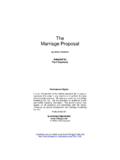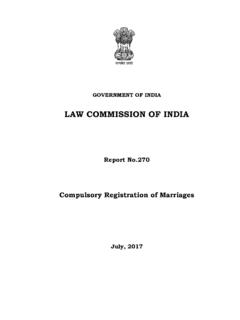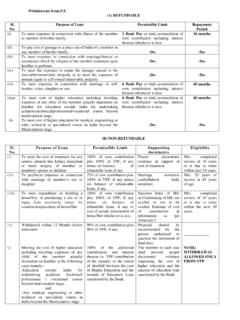Transcription of SOUTH AFRICAN LAW REFORM COMMISSION DISCUSSION …
1 SOUTH AFRICAN LAW REFORM COMMISSION DISCUSSION PAPER 104 Project 118 DOMESTIC PARTNERSHIPS Closing date for comments: 1 December 2003 ISBN: 0-621-34421-4 iiiINTRODUCTION The SOUTH AFRICAN Law REFORM COMMISSION was established by the SOUTH AFRICAN Law COMMISSION Act, 1973 (Act No. 19 of 1973) The members of the COMMISSION are The Honourable Madam Justice Y Mokgoro (Chairperson) The Honourable Madam Justice L Mailula (Vice-Chairperson) Adv JJ Gauntlett Prof CE Hoexter (additional member) The Honourable Mr Justice CT Howie Prof I Maithufi Ms Z Seedat The Honourable Mr Justice W Seriti The Secretary of the SOUTH AFRICAN Law REFORM COMMISSION is Mr W Henegan. The COMMISSION 's offices are on the 12th floor, Sanlam Centre c/o Pretorius and Schoeman Street, Pretoria. Correspondence should be addressed to: The Secretary SOUTH AFRICAN Law REFORM COMMISSION Private Bag X 668 PRETORIA 0001 Telephone: (012) 322 6440 Fax: (012) 320 0936 E-mail: Website: The members of the Project Committee for this investigation are The Honourable Mr Justice Craig Howie Ms Beth Goldblatt Prof Cora Hoexter Prof Ronald Louw Prof Tshepo Mosikatsana The project leader responsible for the investigation is the Honourable Mr Justice Craig Howie.
2 The researchers are Ms AM Louw and Ms CJ PREFACE This DISCUSSION paper has been prepared to elicit responses from interested parties and to serve as a basis for the COMMISSION 's deliberations. Following an evaluation of the responses and any final deliberations on the matter, the COMMISSION may issue a report on this subject which will be submitted to the Minister of Justice for tabling in Parliament. The views, conclusions and recommendations in this paper are not to be regarded as the COMMISSION 's final views. The paper is published in full so as to provide persons and bodies wishing to comment or to make suggestions for the REFORM of this particular branch of the law with sufficient background information to enable them to place focussed submissions before the COMMISSION . The COMMISSION will assume that respondents agree to the COMMISSION quoting from or referring to comments and attributing comments to respondents unless representations are marked confidential.
3 Respondents should be aware that under section 32 of the Constitution of the Republic of SOUTH Africa, 1996 (Act No. 108 of 1996) the COMMISSION may have to release information contained in representations. Respondents are requested to submit written comments, representations or requests to the COMMISSION by 1 December 2003 at the address appearing on the previous page. Any requests for information and administrative enquiries should be addressed to the Secretary of the COMMISSION or the researchers allocated to this project, Ms AM Louw or Ms CJ Pienaar. vi SUMMARY OF LEGISLATIVE PROPOSALS marriage is currently the only legally recognised intimate partnership. Domestic partnerships between people of the same or opposite sex are virtually unrecognised. Partners in such established relationships are excluded from the rights and obligations which attach automatically to marriage despite the fact that they often function in a manner similar to traditional married families.
4 They have to make use of the ordinary rules and remedies of the law, such as those relating to property, contract, unjustified enrichment and estoppel. The number of people living in such domestic partnership relationships has increased worldwide and also in SOUTH Africa. The inception of the interim Constitution and its Bill of Rights in 1994 was the start of a new era in SOUTH AFRICAN legal history, especially in so far as human rights are concerned. Section 9 of the Constitution of the Republic of SOUTH Africa, 1996 states that everyone is equal before the law and has the right to equal protection and benefit of the law. Section 9(3), in particular, prohibits discrimination on the grounds of marital status and sexual orientation. This is, however, not an absolute provision and the right may be limited in terms of section 36 of the Constitution if the limitation would be reasonable and justifiable in an open and democratic society based on human dignity, equality and freedom.
5 The COMMISSION foresees that this will require a balancing act. The proposals set out below are, therefore, aimed at harmonising family law with the provisions of the Bill of Rights and the constitutional values of equality and dignity. The legislative proposals can be summarised as follows: A) SAME-SEX RELATIONSHIPS The COMMISSION considers as unconstitutional the fact that there is currently no legal recognition of same-sex relationships. It is therefore proposed that same-sex relationships should be acknowledged by the law. Recognition could be effected in a number of ways. The following alternatives have been identified: viia) Same-sex marriage Option 1 Common-law marriage The first option entails the opening up of the common-law definition of marriage to same-sex couples by inserting a definition to that effect in the marriage Act of 1961. In terms of this option marriage as it is currently known will be available to both same- and opposite-sex couples.
6 Option 2 Civil marriage The second option entails the separation of the civil and religious elements of marriage . The marriage Act of 1961 will be amended to the extent that it will only regulate the civil aspect of marriage , namely the requirements and consequences prescribed by law. It will also make provision for the civil marriage of both same- and opposite-sex couples. In practice it will mean that both same- and opposite-sex couples will have to solemnise their marriages before a civil marriage officer, whereafter couples who value the religious aspects of marriage will be free to have their marriage blessed before a religious officer in a religious ceremony. Religious institutions may decide for themselves in terms of their own dogmas whether the blessing of their church will be available to same-sex couples or not. b) Civil unions Option 3 marriage -like alternative According to this option couples are accorded a legal status parallel to that of marriage under a separate institution called civil unions.
7 ViiiOption Civil unions for same-sex couples only Under this option, civil unions are implemented as an alternative to same-sex marriage and thus will be available to same-sex couples only. Since it is a model that runs parallel to marriage , the legal consequences following the conclusion of a civil union will be the same as that of marriage . However, in view of the fact that it is not a marriage , a civil union will be regulated in terms of the proposed Registered Partnerships legislation. It will be established by a civil registration procedure and terminated by agreement or a court procedure. Option Civil unions for same- and opposite-sex couples It is anticipated that there may be opposite-sex couples who object to the moral and religious connotations attached to traditional marriage but who do want the legal consequences of marriage . Such opposite-sex couples may also prefer to make use of the option of civil unions.
8 For this reason, under option , civil unions are made available to both same- and opposite sex couples. Except for the extended scope of the proposal, the content of this option is exactly the same as option B) REGISTERED PARTNERSHIPS (same-sex + opposite-sex relationships) Option 1 A Registered Partnerships Act is proposed for partners of the same or opposite sex who do not wish to get married or to obtain all the legal consequences of marriage , but still desire some protection. This proposal entails a formal commitment by the parties with concomitant certainty as to their rights and obligations. Registration of a partnership will afford parties some of the basic rights associated with civil marriage . The proposed legislation prescribes a formal registration procedure, with termination taking place by agreement or court procedure, depending on the circumstances. A default property regime that differs from that of marriage is prescribed.
9 In addition to the property dispensation, registered partners have other rights and duties such as a mutual duty to support each other, the right to intestate succession and delictual claims. Where a child is born into a registered partnership between persons of the opposite sex, the male ixpartner is deemed to be the biological father of that child. There is only a limited right to maintenance between former registered partners after termination of the registered partnership. C) UNREGISTERED PARTNERSHIPS (same-sex + opposite-sex relationships) Under the ascription or status model, unmarried and unregistered partners of the same or opposite sex are awarded a civil status as if they have formally committed to the relationship, without their having taken any steps to effect such recognition. The civil status automatically attaches to relationships under certain circumstances.
10 The proposed options distinguish between de facto relationships and ex post facto relationships. Option 1 - De facto unregistered partnerships Option 1 creates rights and obligations for a couple in a conjugal relationship during the existence of the unregistered relationship. The proposed Unregistered Partnerships legislation prescribes a definition of an unregistered partnership together with a list of factors to be considered by any person who must evaluate the status of the relationship or by a court in the event of a formal dispute of the status of the relationship during its existence. The COMMISSION proposes that the availability of benefits during the existence of such a partnership (ie without the commitment of marriage or registration of the partnership) be limited. The focus of the proposed legislation is on property. The disposal of partnership property is restricted and there is joint liability for household expenses during the relationship.



















